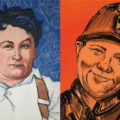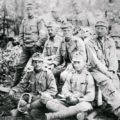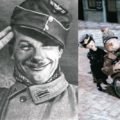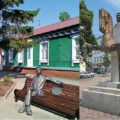- Гашек (первый во втором ряду справа) на фронте во время Первой мировой войны,1915 год
- Экранизации «Похождения бравого солдата Швейка»
- Памятники Ярославу Гашеку
According to a poll by the newspaper Delovaya Praha, Soldier Švejk is one of the most recognizable symbols of the Czech Republic, in addition to famous Czech beer and ice hockey, of course. Interestingly, this character was not the product of Jaroslav Hašek’s extraordinary imagination. In fact, Soldier Švejk is based on the writer’s actual life, which was full of crazy adventures and unique humour.
Let the adventures begin
Jaroslav Hašek was born on April 30, 1883 in Prague. At that time, Czechia was part of the Austro-Hungarian Empire. Anti-German demonstrations were common, and Hašek took an active part in them while still at school. He was also not stranger to fights and scandals, and the writer’s biographers can find valuable information in police reports as well as letters and memoirs.
For instance, the 14-year-old Hašek was once arrested after police found stones in his pockets. Jaroslav insisted that they were intended for the school’s minerals collection, but the authorities decided that the young man was planning to break windows at German stores. Hašek sent a note to his parents, and it already shows the unique style of the future satirist: “Dear mother! Do not expect me for dinner tomorrow as I will be executed. Please tell our teacher pan Gasperg … that the minerals I collected are in the police department.”
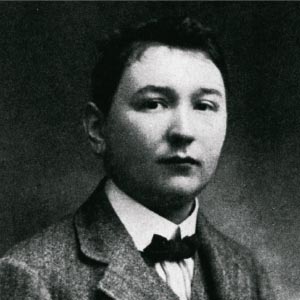 Jaroslav Hašek graduated from the Business Academy in 1902 and got a job at Slavia bank. But the young man had itchy feet and one day he simply did not show up at the office because he went travelling. Hašek visited Bulgaria, Romania, Poland, Hungary, Galicia and Slovakia. He was arrested for vagrancy several times, so we can suggest that it was not a leisurely trip. But upon his return to Prague, Pan Jaroslav publishes his travelogue and decides to become a writer. He sends his sketches to weekly newspapers and magazines and quickly becomes a popular author.
Jaroslav Hašek graduated from the Business Academy in 1902 and got a job at Slavia bank. But the young man had itchy feet and one day he simply did not show up at the office because he went travelling. Hašek visited Bulgaria, Romania, Poland, Hungary, Galicia and Slovakia. He was arrested for vagrancy several times, so we can suggest that it was not a leisurely trip. But upon his return to Prague, Pan Jaroslav publishes his travelogue and decides to become a writer. He sends his sketches to weekly newspapers and magazines and quickly becomes a popular author.
Hašek believes that writing is a craft: he made no secret that he was doing it for money, and that his texts came easy and required no inspiration. And he never misses a chance to play a good trick. For example, Hašek was once working as an editor of a serious magazine Animal World where he wrote stories about “domesticated silver-grey werewolves” and “ancient Idiotosaurus reptiles”.
Hašek’s jokes were so convincing that he was even sent to a mental facility. Here is what happened: the writer was standing on a bridge, staring at the water, and onlookers called the police suspecting him of suicidal intentions. When he was brought in to the station, Hašek introduced himself at the Saint John of Nepomuk, 518 years of age! The police sent the newly canonized saint to a nuthouse. The doctor quickly realized that Hašek was perfectly sane, but the writer refused to leave — instead, he was excitedly walking around and asking questions, gathering interesting facts for future stories. Naturally, Hašek was often fined for his pranks, but to no effect, as the police reports state that “the debtor has no possessions on him that could be confiscated, he lives with his mother and has no property other than the clothes he is wearing”. Meanwhile Pan Hašek made a living describing his adventures in sketches and satirical articles.
At War
In 1915, Jaroslav Hašek was drafted to the army. The World War I provided life experience to create the most famous Czech novel in history. Just like Švejk, Hašek was sent to war as a prisoner, accused of trying to fake rheumatism to avoid recruitment. In the army, Hašek meets the characters of his future novel: Senor Lieutenant Lukáš, Captain Sagner, clerk Vaněk and, most importantly, Lukáš’s batman František Strašlipka who became an inspiration for Josef Švejk. Hašek and Strašlipka were captured by the Russians on September 24, 1915. That is when his incredible adventures in Russia begin. Along with other captive Czechs, Hašek joins the Czechoslovak Legion that fought for the Allies. Pan Jaroslav is primarily engaged in propaganda in POW camps. Meanwhile he continued writing and publishing his humoresques, such as The Emperor Franz Joseph’s Portrait and The Czech Pickwick Club. The Austrian authorities were so outraged by his acerbic humor that he was proclaimed a traitor.
Russia signed a peace treaty with Germany in 1918 and the Czechoslovak Legion began gradually making its way back to Europe. But Hašek chose to stay. Pan Jaroslav went to Moscow to work in the Red Army. From the capital, the promising stumper Hašek is sent to Samara to lead propaganda efforts among the remaining Czechs and persuade them to join the Red Army. Hašek’s unit consisting of Czechs and Serbs was quite successful and even suppressed an anarchist uprising in the city. Pan Jaroslav’s activities in the Red Army did not go unnoticed. The court martial of the Czechoslovak Legion declared Hašek a people’s traitor and issued a warrant for his arrest. The writer then used his trickster skills: Hašek managed to evade patrols for several months using a paper stating that he was “a half-witted son of a German colonist from Turkestan”.
In December 1918, Hašek became deputy military commander, and then the commander of the Bugulma district. In January 1919 he moved to the town of Belebey where he published the Nash Put’ (Our Way) newspaper. His later route passes through Chelyabinsk, Omsk, Krasnoyarsk, and Irkutsk. In Irkutsk, Hašek becomes member of the city council and publishes Sturm and Rogam (Advance) newspapers in German and Hungarian languages, as well as a journal in Russian. He also created perhaps the first ever newspaper in Buryat language, Jur (Dawn). This was not so strange considering that Pan Jaroslav was a polyglot — he knew the Hungarian, German, Polish, Serbian, Slovak, and Russian. For the Buryat newspaper, though, he wrote in Russian and then gave his articles to translators.
The best Book!
In November 1920, the workers of the Czech town of Kladno established a “Soviet Republic”, and Hašek was ordered to return home to support the upcoming proletarian revolution. The revolution never materialized, as opposed to a big surprise for the citizens of Prague. As it happens, while Pan Jaroslav was engaged in propaganda in the Red Army, the Czech press had already proclaimed him dead. Hašek was surprised to learn that he had been hung, shot and even quartered by ‘the wild Kyrgyz’. That was funny, the rest — not so much. He was forced to sell his own books on the streets, but more often he spent time in taverns, writing his humoresques and reading them out immediately.
In August 1921, Hašek moved from Prague to a small town of Lipnice. At that time, his collections Two Dozen Stories, Three Men and a Shark, The Peace Conference and Other Comic Sketches are published. Along them, the novel The Good Soldier Švejk. This novel reflects Hašek’s personal and war experience, as well as his anti-militarist attitude. Švejk successfully pretends to be an idiot, while in fact this is just a way to sabotage idiotic orders from his superiors.
Quotes from Good Soldier Švejk quickly become idioms, or, as we would say now, memes. “And while here they were smashing the king with ace, far away at the front the kings were smashing each other with their serfs”. “Soldiers! … Any bull is luckier than we are. He is slaughtered immediately, without previously spending time at field exercises and at the shooting range”. “A soldier who is convoyed is always more experienced that those who guard him”. Generally, if every soldier was like Švejk, there simply would be nobody to fight wars!
When launching the promo campaign for the novel, Hašek and his friends suggested that readers “get rid of their Tarzan in the Jungle books” and “purchase this innovative example of humor and satire”. The critics did not buy into the advertisement and ruled it an amoral book that respected members of society should not read. Despite that, the first volume of The Good Soldier Švejk went through four editions by 1922, the second — through three. Hašek managed to finish the third volume but did not have the energy for the fourth. He dictated the last words to his secretary just five days before his death on January 3, 1923.
Interestingly, some of the writer’s friends thought that the report of Hašek’s death was another hoax. For instance, a journalist Egon Erwin Kisch said: “I do not believe it! He died so many times! Hašek does not have the right to die, he has not even turned forty.” Nevertheless, Jaroslav Hašek has died. Švejk, on the other hand, proved to be a tougher nut to crack. The novel about the adventures of the good soldier was translated into 58 languages, it was adapted into a puppet film, and even into a quest videogame. Because even in the darkest hour, laughter and common sense remain best weapons in the struggle against the reality that has lost all sense of justice.
Tatiana Borisova

